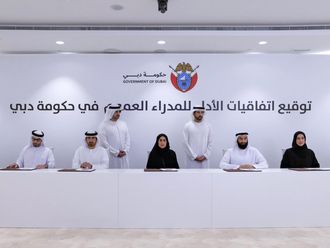Abu Dhabi: The act of giving is deeply ingrained in the culture and traditions of the UAE, which poured Dh9 billion in foreign aid last year or almost 1 per cent of its gross national income (GNI), said His Highness Shaikh Mohammad Bin Rashid Al Maktoum, Vice-President and Prime Minister of the UAE and Ruler of Dubai.
"Since its establishment in 1971, the UAE gave away more than Dh163 billion in foreign aid to fight world hunger and poverty," said Shaikh Mohammad as he launched the first UAE foreign aid report of 2009 in the Emirates Palace Hotel yesterday.
Interactive map: UAE foreign aid distribution in 2009
"This figure could exceed Dh200 billion and might even double if only added to the massive yet difficult-to-track donations by Shaikh Zayed Bin Sultan Al Nahyan and President His Highness Shaikh Khalifa Bin Zayed Al Nahyan, who generously donate to the poor and needy around the globe but never show off," said Shaikh Mohammad.
The UAE gave away more than Dh40 billion in foreign aid between 2000 and 2009.
The UAE donated Dh8.93 billion ($2.43 billion ) to foreign aid last year, according to the Foreign Aid Report of 2009, prepared by the Office for Coordination of Foreign Aid (OCFA).
The aid was provided in more than 1,500 contributions to projects in 92 countries said Hazza Mohammad Falah Al Qah'tani, director general of the OCFA.
Click here to see the full report (PDF)
In 2009, the Abu Dhabi Fund for Development was the largest UAE donor, contributing or administering Dh4.95 billion in grants and loans, followed by the Government which gave Dh 3.06 billion.
The volume of foreign aid shows the UAE's importance as an international donor, said Shaikh Hamdan Bin Zayed Al Nahyan, the Ruler's Representative in the Western Region and President of the Office for Coordination of Foreign Aid.
"The UAE is determined to continue playing its part in the global effort to combat poverty and promote the achievement of the Millennium Development Goals. This is even more significant at a time when the global economic crisis has forced some traditional donors to reduce their aid," Shaikh Hamdan said.
In pictures: UAE aid effors across the world
Rashid M. Khalikov, director of the UN Office for Coordination of Humanitarian Affairs, said the release of the report is timely and shows other partners the country's commitment to humanitarian causes.
Objective of report
The report does not capture UAE foreign aid in its entirety as the Office for Coordination of Foreign Aid (OCFA) relies on information provided by government bodies, foundations and NGOs and the reporting of this data according to Organisation for Economic Cooperation and Development (OECD) standards is still a new enterprise, a senior official said.
"The reporting project was meant to help streamline the humanitarian sector, particularly for future planning, to ensure efficient use of funds and greater transparency, in addition to highlighting the UAE's role as a major donor," said Hazza Mohammad Falah Al Qah'tani, OCFA director general.
He hoped that publishing this report will stimulate donor organisations which have not yet reported to OCFA to do so, in order that OCFA can produce a more complete historical picture of the federation's aid since 1971.
The information in this document, he said, will be reported to international bodies which maintain records of global development and humanitarian funding flows, such as the Development Assistance Committee (DAC) of the OECD and the United Nations' Financial Tracking Service (FTS), a real-time database of the international response to humanitarian emergencies.












